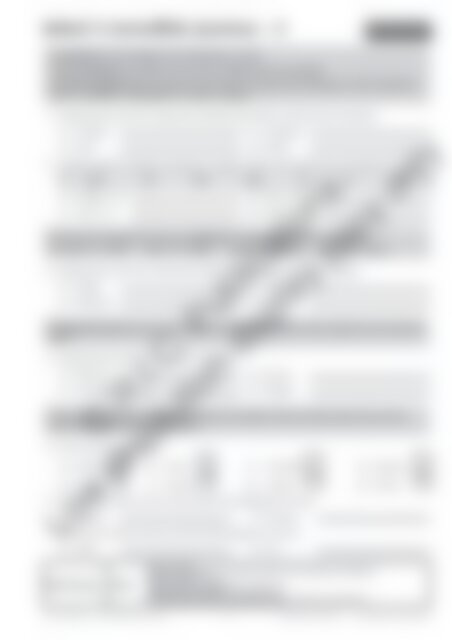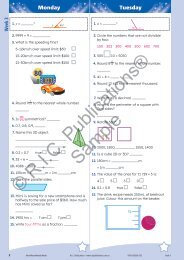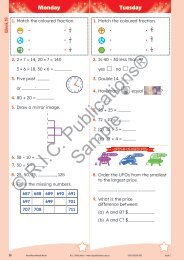3990 Learning at home workbook 6 ebook
You also want an ePaper? Increase the reach of your titles
YUMPU automatically turns print PDFs into web optimized ePapers that Google loves.
Adam’s incredible journey – 3<br />
Word knowledge<br />
A morpheme is the smallest unit of meaning in a word.<br />
A free morpheme can stand on its own as a single word; e.g. possible.<br />
A bound morpheme has no sense on its own but it can give new meaning to a free morpheme;<br />
e.g. im + possible = impossible, re + place = replace.<br />
1. Separ<strong>at</strong>e each word into its base (free morpheme) and suffix or prefix (bound morpheme).<br />
(a) sens<strong>at</strong>ion (b) unpleasant<br />
(c) recall (d) loc<strong>at</strong>ion<br />
2. Choose a suffix to change the class/part of speech of each word. Name the new class/part of speech.<br />
-<strong>at</strong>ion -ion -ible -able -al -ly -ous<br />
(a) collapse, verb (b) heavy, adjective<br />
(c) vision, noun (d) horizon, noun<br />
Some bound morphemes, known as inflections, change the grammar of a word;<br />
e.g. walk + s = walks high + er = higher speak + s = speaks e<strong>at</strong> + ing = e<strong>at</strong>ing<br />
3. Separ<strong>at</strong>e each word into its base (free morpheme) and inflection (bound morpheme).<br />
(a) tingling (b) interested<br />
(c) reflections (d) boy’s<br />
Compound words have two free morphemes with the meaning of each rel<strong>at</strong>ed to the compound<br />
word.<br />
4. Separ<strong>at</strong>e each word into its two free morphemes.<br />
(a) afternoon (b) stairway<br />
(c) moonlight (d) mudfl<strong>at</strong>s<br />
If two words are joined but their meanings do not rel<strong>at</strong>e to the word they make, the word has<br />
only one free morpheme; e.g. deadline.<br />
5. How many free morphemes?<br />
(a) staircase (b) toenail (c) marvelled (d) passport<br />
(e) towards (f) forward (g) outburst (h) another<br />
© R.I.C. Public<strong>at</strong>ions<br />
Low resolution display copy only<br />
6. For each word, find a synonym from the first two paragraphs of the text.<br />
(a) rejected (b) amazing<br />
7. For each word, find an antonym from the fifth paragraph of the text.<br />
(a) reality (b) tiny<br />
My learning log<br />
Colour:<br />
I can / can’t separ<strong>at</strong>e words into their roots, prefixes and suffixes.<br />
I know / don’t know about morphemes.<br />
I understand / need more practice on synonyms and antonyms.<br />
R.I.C. Public<strong>at</strong>ions® www.ricpublic<strong>at</strong>ions.com.au 65 ISBN 978-1-922313-88-1 <strong>Learning</strong> <strong>at</strong> <strong>home</strong> <strong>workbook</strong> 6


















